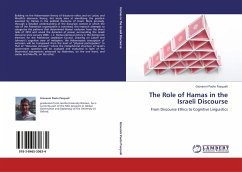Building on the Habermasian theory of discourse ethics and on Laclau and Mouffe's discourse theory, this study aims at identifying the position assumed by Hamas in the political discourse of Israel. More precisely, through a detailed understanding of the discursive context in which the role of the Palestinian organization is conceived, this research attempts to categorize the patterns that determined Hamas exclusion from the direct talks of 2010 and unveil the dynamics of power surrounding the Israeli discourse since January 2006 i.e. Hamas electoral victory in the democratic elections for the Palestinian Legislative Council. Drawing on Lakoff and Johnson s cognitive view of metaphor, the Habermasian conception of exclusion will be transposed from the level of physical participation to that of discursive inclusion where the metaphorical structure of Israel s government speeches will be analyzed and evaluated in light of the theoretical assumptions advanced by Habermas, on the onehand, and Laclau and Mouffe, on the other.
Bitte wählen Sie Ihr Anliegen aus.
Rechnungen
Retourenschein anfordern
Bestellstatus
Storno








